
New Microbiologica
Scope & Guideline
Bridging gaps in understanding with cutting-edge microbiological insights.
Introduction
Aims and Scopes
- Infectious Diseases and Epidemiology:
The journal emphasizes the study of infectious diseases, including their epidemiology, clinical features, and outcomes. Research often focuses on the prevalence and impact of various pathogens in different populations. - Antimicrobial Resistance:
A significant theme in the journal is the exploration of antimicrobial resistance patterns among various pathogens, helping to inform treatment strategies and public health initiatives. - Clinical Microbiology and Diagnostics:
The journal publishes studies on the diagnostic methods for identifying pathogens, including innovations in laboratory techniques and their application in clinical settings. - Host-Pathogen Interactions:
Research on the interactions between pathogens and their hosts is a core area, providing insights into disease mechanisms and potential therapeutic targets. - Innovative Therapeutic Approaches:
The journal highlights novel treatment strategies, including combination therapies and the use of new antimicrobial agents, reflecting ongoing efforts to combat resistant infections. - Public Health and Policy Implications:
Studies that connect microbiological research with public health policy are prevalent, addressing issues such as vaccination strategies, infection control measures, and health education.
Trending and Emerging
- COVID-19 and Associated Infections:
Research related to COVID-19, including its clinical impact, co-infections, and long-term effects, has surged, highlighting the pandemic's influence on current microbiological research priorities. - Molecular Epidemiology and Genomic Studies:
There is a growing trend towards genomic epidemiology, with studies focusing on the genetic characterization of pathogens, particularly in relation to antibiotic resistance and outbreak investigations. - Innovations in Antimicrobial Susceptibility Testing:
Recent publications emphasize advancements in antimicrobial susceptibility testing methodologies, reflecting a need for rapid and accurate diagnostics in clinical microbiology. - Viral Infections and Co-Infections:
The investigation of viral pathogens, particularly their interactions with other pathogens and their role in disease severity, has gained prominence, especially in the context of respiratory viruses. - Public Health Strategies for Infection Control:
Emerging themes include public health strategies aimed at controlling infectious diseases, with an emphasis on vaccination, surveillance, and health policy to mitigate outbreaks.
Declining or Waning
- Traditional Antibiotic Studies:
There appears to be a waning interest in studies solely focused on traditional antibiotics without consideration of resistance patterns or combination therapies, as the field moves towards a more integrated approach to antimicrobial treatment. - Basic Laboratory Techniques:
Papers focusing exclusively on basic microbiological laboratory techniques are becoming less common as the field emphasizes more complex methodologies and technologies, such as molecular diagnostics and next-generation sequencing. - Non-Infectious Microbial Studies:
Research that does not directly relate to infectious diseases, such as studies on microbiomes in non-clinical settings, is less frequently published, possibly in favor of more clinically relevant microbiological research.
Similar Journals

Klimik Journal
Pioneering Research in Microbiology.Klimik Journal is a pivotal publication in the fields of Infectious Diseases and Medical Microbiology, serving as a platform for researchers, clinicians, and academics to disseminate groundbreaking findings and improve health outcomes. Established in 2010 and published by DOC DESIGN INFORMATICS CO LTD, this journal is dedicated to advancing knowledge and fostering discussions around critical issues in infectious diseases and microbial research. With an ISSN of 1301-143X and an E-ISSN of 1309-1484, Klimik Journal strives to maintain high academic standards despite currently ranking in the fourth quartile in both categories according to Scopus metrics, which highlights the need for continued contributions to the field. Operating from Turkey, the journal is committed to supporting open access options, thereby ensuring wide dissemination of research findings. As it continues to bridge the gap between theory and practice, Klimik Journal is poised to become an essential resource for those looking to stay at the forefront of infectious disease research and microbiological advancements.
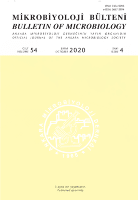
MIKROBIYOLOJI BULTENI
Exploring Innovations in Infectious Disease ResearchMIKROBIYOLOJI BULTENI, with ISSN 0374-9096, is a prestigious academic journal published by the ANKARA MICROBIOLOGY SOC, located in Ankara, Turkey. Established in 1973, this journal has been a vital conduit for disseminating research in the fields of Immunology, Microbiology, and Infectious Diseases, garnering a reputation as a significant contributor to the scientific community. The journal is currently ranked in the Q3 category within Immunology and Microbiology (miscellaneous), and Infectious Diseases, indicating its impactful presence amidst contemporary research. With access options that may be restricted, MIKROBIYOLOJI BULTENI actively welcomes submissions that advance the understanding of critical microbiological principles and practices, thereby supporting both national and international research efforts. Researchers, professionals, and students are encouraged to explore the latest findings shared in this journal, as it continually shapes the landscape of microbiology and infectious disease studies through its comprehensive and rigorous peer-reviewed publications.

Mediterranean Journal of Infection Microbes and Antimicrobials
Fostering global collaboration on microbial challenges.Mediterranean Journal of Infection Microbes and Antimicrobials is a distinguished open-access journal published by GALENOS PUBL HOUSE, dedicated to advancing the understanding of infectious diseases and microbiology. Since its inception in 2011, this journal has been a vital resource for researchers, professionals, and students interested in the intricate world of microbes and their impacts on human health. With its ISSN 2147-673X, the journal has progressively gained visibility, although it currently holds a Q4 ranking in multiple categories including Immunology and Microbiology, and Infectious Diseases for the year 2023. The journal operates from its headquarters in Istanbul, Turkey, and features a rich array of articles that contribute to the field’s body of knowledge. As a platform enhancing the accessibility of research, it invites submissions from global contributors to foster collaboration and innovation in tackling microbial challenges.

Journal of Laboratory Physicians
Unlocking the potential of laboratory science for better healthcare.The Journal of Laboratory Physicians is a prestigious, peer-reviewed publication dedicated to advancing the field of laboratory medicine. Published by THIEME MEDICAL PUBL INC, this journal has established itself as a vital source of research and clinical insights since its inception, transitioning to Open Access in 2009 to broaden its reach and accessibility. With an ISSN of 0974-2727 and an E-ISSN of 0974-7826, it aims to provide a platform for professionals, researchers, and students engaged in laboratory-based studies to share critical findings and foster collaboration across disciplines. The journal's scope encompasses a wide range of topics relevant to laboratory physicians, ensuring that it remains an essential resource for those seeking to stay on the cutting edge of laboratory practices and innovations. By disseminating timely research and reviews, the Journal of Laboratory Physicians plays a crucial role in enhancing the quality of healthcare through improved laboratory services.
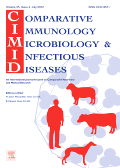
COMPARATIVE IMMUNOLOGY MICROBIOLOGY AND INFECTIOUS DISEASES
Exploring Host-Pathogen Dynamics for Global HealthComparative Immunology Microbiology and Infectious Diseases, published by Elsevier Science Ltd, is a prominent journal dedicated to advancing the fields of immunology, microbiology, infectious diseases, and veterinary sciences. Established in 1978, this journal has become a vital resource for researchers and professionals alike, with a commendable impact factor that reflects its significance in academia. The journal, available in both print and electronic formats (ISSN: 0147-9571, E-ISSN: 1878-1667), stands out for its commitment to disseminating innovative research findings, particularly through its categorization in Q2 and Q3 quartiles across various related disciplines as of 2023. The journal aims to provide insightful comparative analyses that enhance our understanding of host-pathogen interactions, immune responses, and disease manifestations. With a global readership base, it serves as a platform for collaborative discourse among scientists and professionals, ultimately contributing to the improvement of health outcomes worldwide.

New Microbes and New Infections
Exploring the unseen world of microbes and their impact on health.New Microbes and New Infections is an esteemed peer-reviewed journal published by Elsevier Sci Ltd that has been a prominent platform for disseminating groundbreaking research in the fields of Infectious Diseases and Microbiology since its establishment in 2013. With an impressive Open Access model, this journal ensures that vital research findings are readily accessible to researchers, healthcare professionals, and academics worldwide. Positioned in the Q2 category for Infectious Diseases and Q3 for Microbiology in 2023, it reaches a significant global audience, as demonstrated by its high Scopus rankings—#44 out of 344 in Medicine: Infectious Diseases, and #34 out of 182 in Immunology and Microbiology. The journal aims to inspire new ideas and foster collaborations by publishing high-quality research focused on novel microbes and infections, thus playing a crucial role in advancing science and public health in an era where understanding infectious agents is more vital than ever.

BMC MICROBIOLOGY
Connecting minds through groundbreaking microbiology insights.BMC Microbiology is a leading open access journal published by BMC, dedicated to advancing the field of microbiology since its inception in 2001. With an ISSN of 1471-2180, this journal provides a vital platform for researchers, professionals, and students to share and access high-quality research and innovation in both general and medical microbiology. Based in the United Kingdom, BMC Microbiology holds a commendable Q2 ranking in both various microbiological categories according to the 2023 Scopus rankings, indicating its strong influence in the microbiological community, with a rank of #47 out of 140 in Medical Microbiology and #62 out of 182 in general Microbiology. The journal's commitment to open access ensures that groundbreaking research is freely available to facilitate collaboration and knowledge sharing among the global community of microbiologists. With a focus on publishing original research, reviews, and case studies, BMC Microbiology plays a critical role in disseminating information that can impact health and environmental conditions around the world.
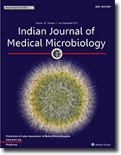
Indian Journal of Medical Microbiology
Advancing the Frontiers of Medical MicrobiologyIndian Journal of Medical Microbiology, published by Elsevier, is a pivotal peer-reviewed journal dedicated to the field of medical microbiology, providing a vital platform for research and scholarship since its inception in 1986. With an Open Access model established in 2001, it ensures the dissemination of scientific knowledge to a global audience, enhancing accessibility for researchers, professionals, and students alike. The journal's scope spans critical areas including immunology, infectious diseases, and microbiology, with an impressive trajectory marked by converged years of publication allowing for a comprehensive exploration of evolving scientific trends. As of 2023, the journal holds a Q3 ranking in Infectious Diseases and Microbiology (medical) and a Q4 ranking in Immunology and Microbiology categories, reflecting its significant yet growing impact in the field. Researchers seeking to contribute to or stay updated on the latest advancements in medical microbiology will find the Indian Journal of Medical Microbiology a valuable resource, as it consistently bridges the gap between emerging science and clinical application.
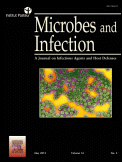
MICROBES AND INFECTION
Pioneering Research in the Fight Against InfectionMICROBES AND INFECTION is a premier academic journal published by Elsevier, dedicated to the dynamic fields of immunology, infectious diseases, and microbiology. With a notable impact factor reflective of its high-quality research contributions, the journal is categorized in the Q2 quartile across these fields as of 2023. Based in France and operating since 1999, MICROBES AND INFECTION offers a platform for researchers, professionals, and students to disseminate and access cutting-edge findings that drive innovation and knowledge in microbial and infectious disease research. The journal is ranked impressively within the Scopus database, securing ranks such as #16 in Microbiology and #33 in Infectious Diseases, underscoring its high relevance in the scientific community. Subscribers to the journal can expect an array of articles, reviews, and original research, all designed to advance understanding and improve clinical practices in the fight against infectious agents. With its ongoing commitment to open access options, MICROBES AND INFECTION continues to foster global collaboration and information sharing in the pursuit of addressing pressing microbiological challenges.
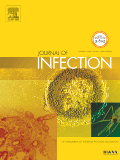
JOURNAL OF INFECTION
Pioneering Insights into Infectious ProcessesJOURNAL OF INFECTION is a premier academic publication in the fields of infectious diseases and medical microbiology, published by W B SAUNDERS CO LTD. With a profound impact factor and established since 1979, this journal serves as a crucial resource for researchers, clinicians, and policy-makers seeking to advance knowledge and understanding of infectious processes and their management. The JOURNAL OF INFECTION holds an impressive position in the academic hierarchy as reflected by its Q1 quartile rankings in both Infectious Diseases and Microbiology (medical) for 2023, further underscored by its Scopus rankings: #2 in Medical Microbiology and #5 in Medical Infectious Diseases, placing it in the 98th percentile overall. While the journal does not offer Open Access options, it provides a comprehensive outlet for innovative research, reviews, and clinical insights that drive the field forward. Published from the United Kingdom, it attracts a global readership keen on staying at the forefront of infectious disease research, making it an essential addition to any academic and clinical library.